A Journey of Perseverance: The Deaf Emissary Making a Difference
Rabbi Isser Lobatzky, Chabad's emissary to the deaf in France, faced challenges growing up as a child. Yet, from amid these struggles, he made a pivotal decision: "To act for the deaf." Today, he unites Jewish deaf communities across France, asserting, "We can be a part of the community, give us a chance."
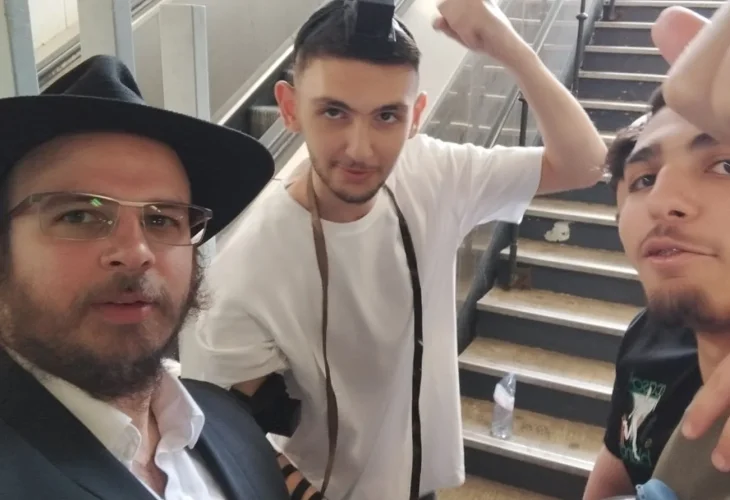 Rabbi Isser Lobatzky at a "Tefillin Campaign" in the Paris subway
Rabbi Isser Lobatzky at a "Tefillin Campaign" in the Paris subwayHow do you make Havdalah using sign language? How does a deaf person "hear" the shofar blast? And is a deaf Jewish boy required to have an aliyah at his Bar Mitzvah? These questions aren't merely theoretical; they're part of the everyday life of Rabbi Isser Lobatzky, Chabad's emissary to the deaf Jewish community in France.
Lobatzky, himself deaf from birth, knows these challenges firsthand. "If someone had told me as a child that one day I'd study Torah like everyone else and even complete the Talmud several times with other deaf individuals, I wouldn't have believed them," he notes. "But that's precisely why I'm here — to prove to other deaf people that it's possible, and to make the path easier for them so they don't have to go through what I did."
Sign Language Learning
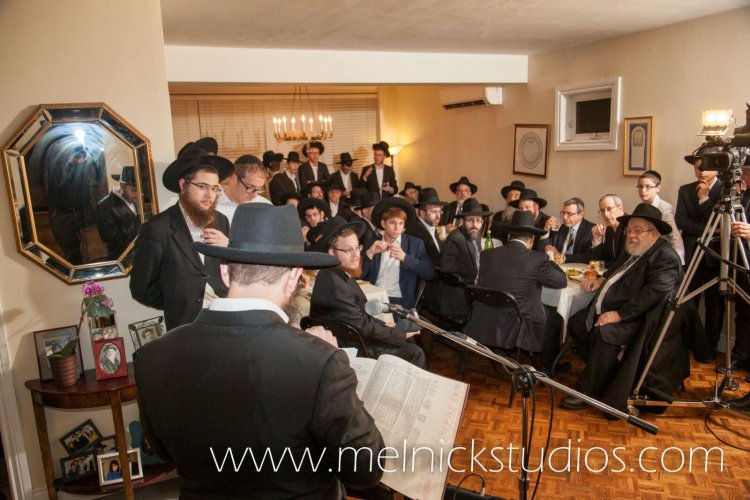 Rabbi Lobatzky's first Talmud completion at his Rosh Yeshiva's home, Rabbi Kakon
Rabbi Lobatzky's first Talmud completion at his Rosh Yeshiva's home, Rabbi Kakon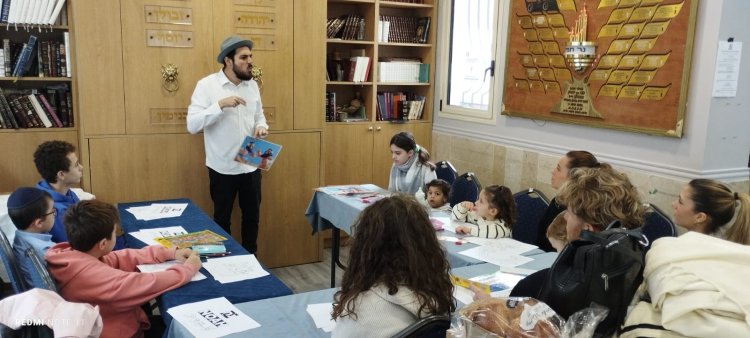 Torah lesson for deaf children
Torah lesson for deaf childrenFrom Struggle to Success: One Daf at a Time
Rabbi Lobatzky starts his story with the birth of his eldest brother, Levi. "Shortly after Levi was born, my dear parents realized he was nearly deaf," he recounts. "When Levi grew up, my father asked the Rebbe of Lubavitch if he should enroll Levi in a special, non-Jewish government school as all the doctors and educators recommended. But the Rebbe told him: 'He should attend cheder, because a Jewish child must grow up with Torah and mitzvot.' Rabbi Shmuel Azimov, the Rebbe's main emissary in Paris, ran the cheder, and following him, my other deaf siblings and I took the same path."
Rabbi Lobatzky grew up attending the cheder but struggled to understand his teachers. A speech therapist who came to the cheder two or three times a week helped him take part in classes by teaching him reading, writing, and a basic everyday vocabulary. This is how he learned to read and write, in both French and Hebrew, and to do arithmetic.
It certainly wasn’t easy being a deaf child. What was the main challenge?
"While I managed during playtime and leisure, I mostly envied my friends and siblings during Torah lessons because I couldn’t learn or pray at all, which was very discouraging. I remember in ninth grade, my teacher, Rabbi Daniel Mazuz, studied one-on-one with me every day for a year. He truly tried to explain it to me, but I found it extremely hard to grasp the material. At the end of the year, we discovered he managed to teach me just one page in Tractate Shabbat... It was hard and frustrating, but it was undoubtedly the breakthrough in learning that led me to finish the Talmud twice, and now I'm about to complete it for the third time.
"There was also something else that gave me strength, because as a deaf child, I decided to do 'missions' with deaf Jews in a nursing home nearby my parents' house: I helped them put on tefillin — just like my brothers and father helped other Jews better know their Judaism. The seniors were amazed to see a deaf child observing mitzvot, wearing a kippah and tzitzit, who knew how to pray and more. It turned out that no one ever thought to help them put on tefillin until I came."
19 Kislev Gathering with the Sign Language Interpreter
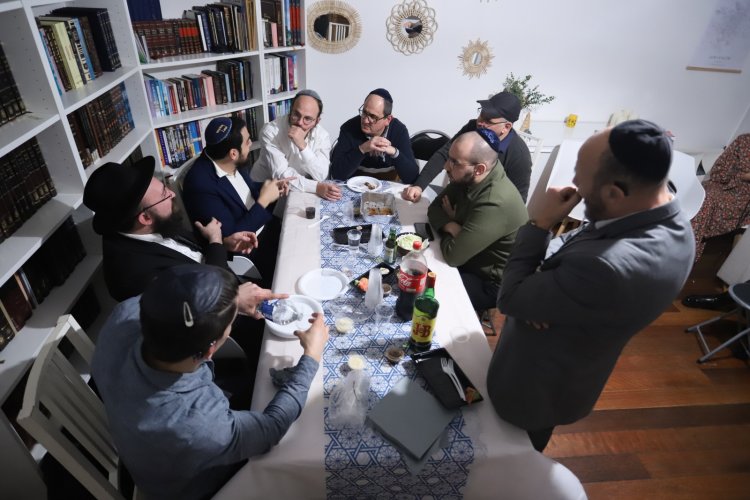 Torah lesson for deaf children
Torah lesson for deaf children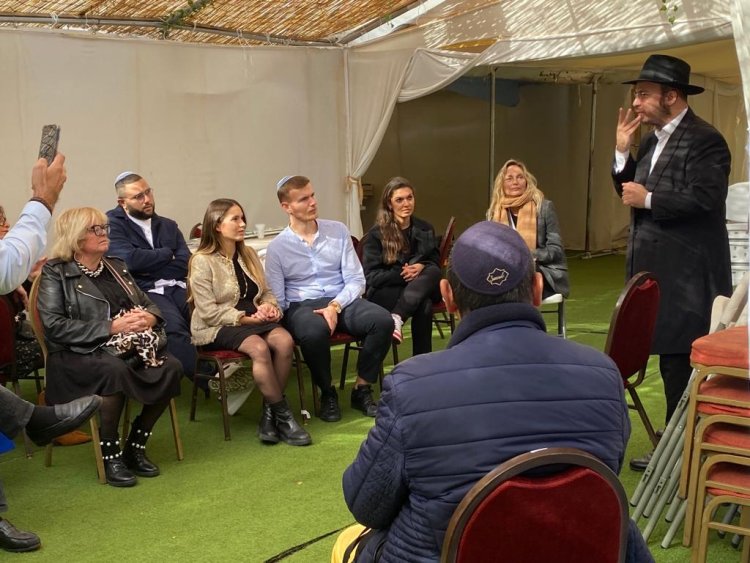 On Sukkot. Explaining the commandment of shaking the lulav
On Sukkot. Explaining the commandment of shaking the lulavThe Emissary for the Deaf
"Shortly after my Bar Mitzvah," Rabbi Lobatzky shares, "when I was about 15, I learned about a yeshiva in Toronto called 'Nefesh David' for deaf children, founded and run by Rabbi Kakon, who is also deaf from birth. I was accepted there and studied for almost six years. The more I learned, the more I realized that my path was in the Torah, strengthening me in Torah values. This was something I didn’t know until then because in France, there was no reality of learning Torah in sign language. The yeshiva gave me a thirst for learning, and that's how I became a Torah scholar, thank G-d."
Today, Rabbi Lobatzky is happily married and blessed with two hearing children, thank Hashem. He works as a kashrut supervisor at a butcher shop under the rabbinate's supervision and also repairs tzitzit and binds damaged holy books. But his free time is devoted to what he considers his most important endeavor: teaching Torah to deaf Jews.
"I do this through WhatsApp groups where I share short Torah lessons and stories from the Tanach," he explains. "In all our conversations, I try to encourage and strengthen their faith, explaining that they should trust in Hashem and fear nothing. Also, once a week, I give a lesson translated by my good friend David Ohana, who speaks and understands sign language."
This activity, now an integral part of Rabbi Lobatzky's daily life, was not taken for granted initially, especially given the few religious deaf Jews in France.
"When I got married about 12 years ago, I asked my rabbi, Rabbi Shmuel Azimov, about my future — whether I should study in a kollel in Toronto, New York, or maybe in Israel," he recounts. "I was very unsure, but Rabbi Azimov advised me to stay in Paris and be the 'emissary to the deaf Jews in the entire region.' This unexpected advice gave me much strength and confidence, as all my hearing family members are involved in emissary work, and I never thought I could take part in it too. Thus began my journey as 'the emissary to the deaf community in France', with my wife Anelle by my side, greatly aiding in all the activities."
As years passed, Rabbi Lobatzky met more deaf Jews living throughout France — in Strasbourg, Lunéville, Bordeaux, Toulouse, Lyon, and beyond. "Generally, every Chabad emissary finds themselves answering questions and teaching about Judaism, but in my case, since it involves the deaf community, the questions are often more complicated, as people want guidance on how to practice with their limitations," he explains.
"I constantly receive questions like: what to do with the shofar blowing, aliyah to the Torah, Havdalah, and so on. Since most deaf people I encounter haven't learned the basic laws of the Shulchan Aruch, it’s also an opportunity to introduce them to the fundamentals of Judaism. Usually, I communicate with them through the internet, WhatsApp messages, and SMS, and sometimes we meet in person for lessons. Additionally, on Sunday mornings, once a month, David Ohana teaches about ten deaf boys and girls in religious school who all wish to learn Torah. The study is, of course, in sign language, and it is very touching and important.
"On the eve of holidays, I send them reading materials and explanations about the holiday to know how to observe the mitzvot. I also encourage their participation in Jewish activities — attending the Passover Seder, going to the synagogue on Shavuot, and similar events. Even though they can't hear, they can undoubtedly have a pleasant experience with the other congregants. Unfortunately, there are deaf individuals whose lives are more limited due to their disability, but there is a way for us to assist them, and it’s certainly required of us."
Rabbi Lobatzky as an infant with the Rebbe of Lubavitch
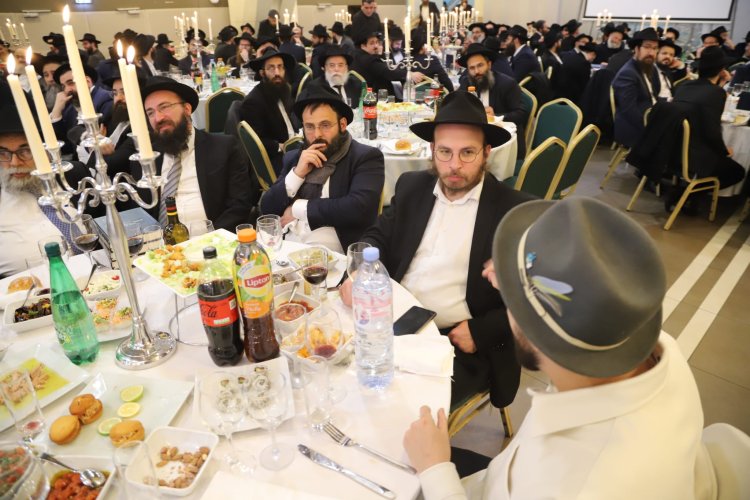 Conversing at an event using sign language
Conversing at an event using sign language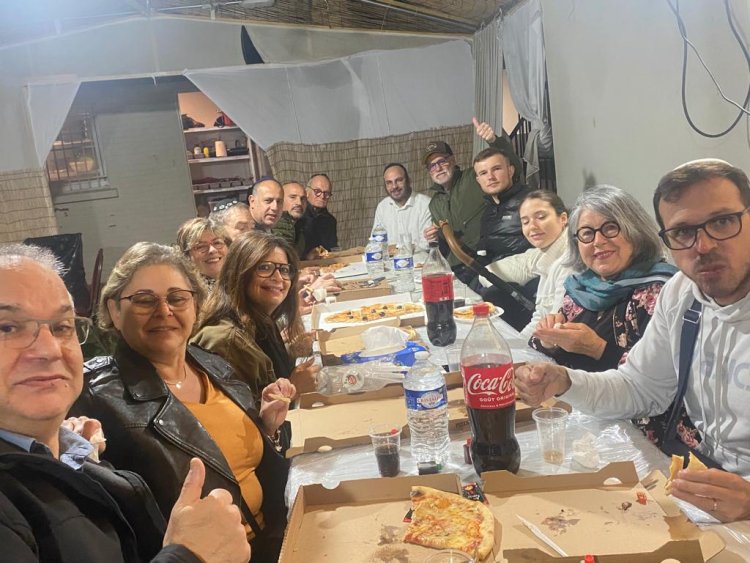 Event for the deaf community during Sukkot
Event for the deaf community during SukkotBecoming a Part of the Community
Despite his extensive work, Rabbi Lobatzky notes he's not yet able to execute all the intended projects. "We have so many ideas and initiatives," he explains, "and I'm still looking for more people across France who know sign language and can help us. If we have more volunteers, we can offer more live classes and videos and thus connect with more deaf individuals interested in learning about their Jewish heritage. We hope to encourage Jewish marriages too, as they often gravitate toward non-Jewish environments where missionaries convert them to Christianity, unfortunately."
Rabbi Lobatzky points to the greatest need in the deaf community as simply creating a connection, so they feel less isolated and understand they are a significant part of the community. "Additionally," he says, "since they are spread across France, I want them to have opportunities to meet during special times like holidays or Shabbat or on weekends. Many don't have the means to travel or fear traveling alone, so I strive to find them companions and interpreters in sign language."
He concludes with a message for every deaf person reading these words, whether they live in Israel, France, or anywhere else: "We must overcome the stage of seeing ourselves as limited and decide that we too can contribute and benefit the community. Let's not complain or blame others for 'not being there for us,' because hearing people find it hard to understand us, and we find it hard to understand them. But I'm sure that with a bit of goodwill from both sides, we can become well-integrated into the community and be beneficial.
"Importantly, understand that whenever a deaf Jew performs a mitzvah, puts on tefillin, chooses to marry a Jewish partner or sends their children to a Jewish school, it's a major victory for all of us. Let's do what we can to integrate into the community, draw closer to Hashem, and, of course, yearn for Moshiach just like other Jews, so we can be among the first to greet him soon, with Hashem's help."

